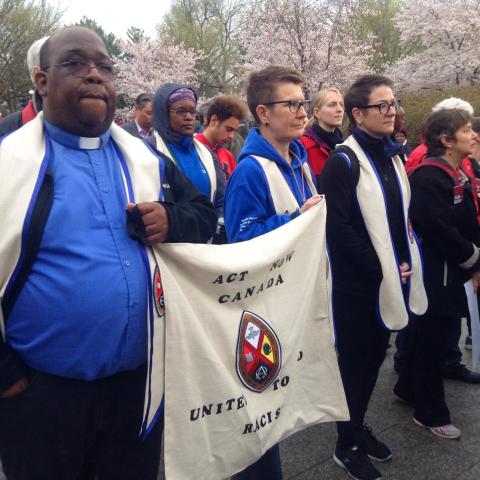The church has a prophetic responsibility to call for repentance for the sins of racism, White privilege, and White entitlement.

It was one of those mornings where I had 30 minutes of stuff to do before I left home, but only five minutes to get into the car and get to the office. I stopped to look at my phone and there it was an email from the General Secretary. My first thoughts were, “What have I done now?” The email was an invitation to be part of a United Church of Canada delegation to a National Council of Churches (USA) event to mark the 50th anniversary of the assassination of Dr. Martin Luther King, Jr. in Washington D.C. on April 3-5, and included a march to end racism. I did not need to read anything else, I was sold, and I quickly responded to tell the General Secretary that I was in.
The United Church of Canada was a partner for the event and we were invited to participate through our partnership with the United Church of Christ. Our delegation included the Moderator, Rt. Rev. Jordan Cantwell, Kate Rodd (Executive Officer for Communications in the General Council office), Rev. Bill Smith (Executive Secretary, Bay of Quinte Conference), Laura Fouhse (diaconal minister and spouse of the Moderator), Alydia Smith (General Council’s Program Coordinator for Worship, Music, and Spirituality), and myself.
Our first full day in Washington included a prayer witness with The United Methodist Church Council of Bishops. In the evening we attended an ecumenical gathering to end racism at the Saint Sophia Greek Orthodox Cathedral. The message at the gathering highlighted the need for repentance. In the words of Archbishop Demetrios, of the Greek Orthodox Church, repentance was needed if we are to truly eradicate racism from the land. The repentance he was speaking about was the wholehearted change in the way we live and relate to each other, it was about the changing of the heart. It was clear from the message of the archbishop that he was speaking directly to non-racialized people, he was speaking to White people to act.
On April 4, we set out for the ACT to End Racism march. The march began at the Martin Luther King, Jr. national monument and ended at the National Mall. It is reported that approximately 8,000 people attended. The march culminated in an all-day rally on the Mall. Throughout the day the call was to “ACT: Awaken, Confront, and Transform.” Speaker after speaker called upon society to awake to the fact that racism is present. Black speakers spoke about the effects of racism on their lives. White speakers spoke about the need to acknowledge the reality of systemic racism and White privilege. It was a time of sober acknowledgement that something was wrong in society. People were saying enough is enough.
I left the rally understanding that society cannot act as if Black people alone must be in the forefront against racial prejudice. White people must also be there. Racism is a problem caused by the White privilege, and it will have to be White people who change their outlook and behavior to stop it. Repentance is needed!
As our group gathered during that day the question uppermost on my mind was, “How we translate this to the Canadian context?” I could imagine people suggesting, “That was in the US, we don’t have racism here, or at least not that type of racism.” There is a sense of truth in that statement. Racism in Canada is subtler, and it is not as often “in your face,” as in the US. But the reality is the subtle racism is more dangerous than the “in your face” variety. The challenge was how to help church and society awaken to the reality of racism and its existence in Canadian society.
The other challenge was, how do we engage our White United Church membership about White privilege and White entitlement? How can this be done without making people feel that we are attacking them or trying to make them feel guilty? I wondered if it could begin by taking an honest look at our history and the fact that so much of the Canadian society has been built on the bodies of the Indigenous peoples, Black enslaved people, and other racialized groups. You see, to say that racism exists in Canada is not to call all White people racist. It is however, to acknowledge that we live in a society which has been built and bolstered by the subjugation and dehumanization of groups of people because of their race; and that many of the values, norms, and ways of relating to each other in the society arise from this reality.
The United Church of Canada is not new to the fight against racism. Formally, the General Council took a stance against racism and discrimination a long time ago. But it still exists in many ways in the church. Indeed, I was reminded that many, many workshops have been held throughout the church to sensitize people to the need for being an intercultural church and to eradicate racism. We have been here before. Yet given our history I see no other path before us than to continue the work of awakening our church and our country to the reality of racism. I wonder too, if at the upcoming General Council, we could begin a process of each person making a commitment to confront racism when we see it or hear it. The church has a prophetic responsibility and we must use our voice to call for repentance in the country for the sins of racism, White privilege, and White entitlement. Racism can end if we all work towards that end!
—Paul Douglas Walfall is the ministry personnel in the Fort Saskatchewan Pastoral Charge in the Yellowhead Presbytery, Alberta and Northwest Conference. See more photos from the event here.